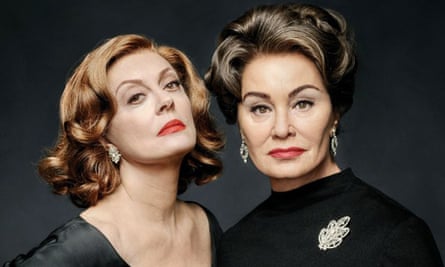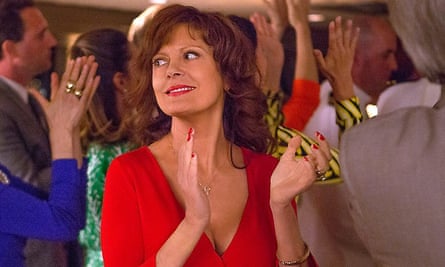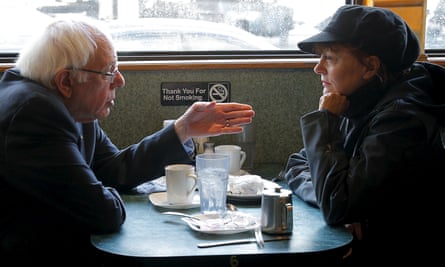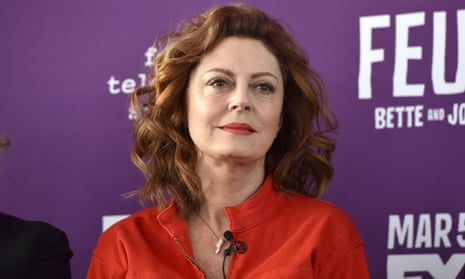Susan Sarandon is here to talk about a much-publicized feud between two successful women. But, as the Oscar-winning actor and activist had made crystal clear the week before I spoke to her, during a tense interview on MSNBC’s All In, she’s not interested in talking about that feud.
Rather than yet another over-analysis of her role in Hillary Clinton’s shock election loss, she’d rather turn the discussion to talk of Bette Davis and Joan Crawford, two women also pitted against each other, this time in 1960s Hollywood. In Feud: Bette and Joan, the latest FX show from Ryan Murphy, creator of American Horror Story and American Crime Story, the intricacies of their famed battle are brought to vibrant life with Jessica Lange as Joan Crawford and Sarandon playing Davis. It’s a fun, snappy eight-episode behind-the-scenes reveal (the next season will focus on the feud between Prince Charles and Princess Diana) and provides a worthy reminder of the destructive influence that meddling men had in tearing the two women apart.
“This is a really blatant example of trying to control two people by making sure they don’t join forces,” she tells me on the phone, dog yapping in the background. “I think that mentality and lack of imagination you can see in all the reality shows. That’s the entirety of their plots: just turning women against each other and getting them drunk so that something dramatic happens, even if it’s a fight over nothing. It’s always easier, I think, to suck people into drama when it’s negative as opposed to something that’s constructive.”

If there’d been a Real Housewives of Hollywood in the early 60s, Bette and Joan’s on-set sparring while making Whatever Happened to Baby Jane? would have made for a ratings magnet. There was a pay dispute, nastiness in gossip columns, petty pranks and even physical violence. But over 50 years later, the business is different: studios no longer own stars in the way they once did and women are making headway towards equality. Competition is not what it once was.
“I think that happened just in my generation,” Sarandon says. “I see examples of actresses just a little bit ahead of me who really saw women as their enemy and had no intention of forming any kind of alliance. Now, that’s certainly not true. You might be envious of a part you didn’t get but it’s switched to understanding that you need women as allies and that we’re stronger together, not divided.”
It’s an ethos that’s been reflected throughout her career, with roles in a number of Bechdel test-smashing films, including The Witches of Eastwick, Thelma and Louise, Little Women, Stepmom and last year’s acclaimed comeback vehicle The Meddler. She’s also been keen to work with more female directors, having recently worked with a set of them on the production of Feud, but one area of equality that she’s less sure about is that awkward matter of who gets paid what.
“I don’t think it matters that Jennifer Lawrence is paid 70 times more than what I am,” she says. “It’s a business that is so subjective and I feel so lucky to be able to earn a living, and this is why to go after pay equality is a really chancy subject – because if Tom Cruise has a leading lady that’s in the movie as much as he is, should she get the same amount of money if she’s been in the business a shorter amount of time? And should a character actor that’s been in the business for 50 years not get paid more? It’s a sin what happens to these supporting actors through the years where they can barely exist on the pay they get. There’s no equity in terms of value, and who knows how these decisions are made. So you can’t apply that to feeling unfair because the whole fact that actors get paid as much as we do is ridiculous. I mean, what a fabulous life. I can’t bitch about whatever my pay level is. I don’t focus on that.”

But as content as Sarandon seems, there’s no denying that she’s been frustratingly absent from the spotlight in recent years. She’s not stopped working but more often she’s been taking on small, little-seen roles. It’s not simply a dearth of scripts for women of a certain age in the industry, it’s also Sarandon being understandably picky. Unlike many other Oscar-winning female actors, she’s resisted the urge to take on thankless roles in franchise fodder. She chose not to play the doomed female president in last year’s Independence Day: Resurgence (“When I read the script, I couldn’t understand what was going on”) and the only sequel you’ll see her in any time soon is John Turturro’s Big Lebowski spin-off (something she calls “a crazy film” that she “still can’t believe they got the money for”).
After the success of Thelma and Louise, many thought it would be a game-changer, showing Holly-bros that there’s a sizable audience for a film about female friendship – but as Bridesmaids has since shown, these hits are often seen as unlikely exceptions and fail to cause the seismic shift predicted. “I think that a woman can look at a story that has a male protagonist and can identify that she could do that or be in that situation,” she says. “But I think it’s harder for male executives to imagine that anybody is really gonna get into a female lead because it’s hard for them to imagine. I don’t think it’s meant to be a mean thing, I just think it’s a lack of imagination.”
It’s meant that, while she’s starred in a number of aforementioned female-fronted films, she’s still been paired mostly with men throughout her career. It’s been a generally harmonious time, but Sarandon recalls the closest she’s got to having a Bette v Joan situation. “There was one gentleman,” she says. “He hadn’t really done films, I don’t think, and he was in the midst of a very successful TV run and was a heart-throb. There were definitely some problems and he’d developed some habits, because in the atmosphere where he was working, he wasn’t used to women challenging him in any way and was spoiled by the rules that they set up. At one point, they allowed him to leave on my reverse at the end of the day, so I was suddenly expected to do my lines with the script supervisor and him gone for my close-up.”
She won’t give me a name but she counts it as a rare occurrence. “I don’t thrive on tension or any kind of aggression,” she says. But it’s an unavoidable part of the job, especially, depressingly, for a woman who chooses to speak her mind. While men might still be seen as “brave” and “refreshing”, women who speak out are still often painted as “difficult” or “bitchy”. Sarandon knows this all too well.
“I think it is more annoying to have a woman with opinions for a lot of people,” she says. “I couldn’t give you any solid proof that has hurt my chances in the business. Today in the New York Times, they were talking about the Academy awards and the fact that I was one of the people who didn’t get a nomination for The Meddler, and [it] mentions that it might have something to do with the Clintonized Hollywood, when I supported Bernie Sanders.”

Which brings us to the elephant in the room (or over the phone). Sarandon was a vocal supporter of Sanders as he ran against Clinton to become the Democratic pick for president. When he lost out on the nomination, she expressed her frustration and publicly endorsed the Green candidate Jill Stein instead, stating that she did not vote with her vagina. She had previously called Clinton “more dangerous” than Trump.
“I have had a huge amount of backlash,” she says. “There’s been a really strong blame for a lot of things that are obviously not my fault.”
A cursory scan of Twitter shows a stream of bile all the way from the Will & Grace star Debra Messing to the author Kurt Eichenwald. Sarandon remains defiant, unapologetic and frustrated with Democrats who suggest that she’s let the party down.
“There’s no valid argument,” she says. “It’s just an easy place to put your frustrations, to blame me. I mean, if you read the list of people who voted Hillary Clinton – and then I think it’s me and Viggo Mortensen on the other side. You’d have to be delusional to actually think that Beyoncé and Jay Z and George Clooney and Julia Roberts and Meryl Streep, and the list goes on, were actually overpowered by the two of us.”
But she’s unperturbed, still hyper-aware of the daily failings of Trump’s government. And despite resistance, she’s continuing to show up at Democratic events, such as a recent anti-Trump rally in New York. “I’m focusing on reaching out and forming a coalition not only with all of Hillary’s people but with people I know that voted for Trump, because we have serious work to do now, and we can’t indulge in blaming or depression or any of those things,” she says. “There isn’t time any more to look back. We have to look forward.”
- Feud begins on FX on 5 March at 10pm with a UK broadcaster yet to be confirmed

Comments (…)
Sign in or create your Guardian account to join the discussion